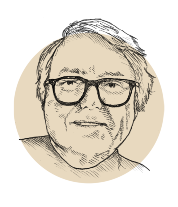The farmers’ grievances are many and varied, but three stand out in particular: fuel taxes, excessive regulation, and unfair competition from countries not subject to similarly exacting environmental standards. These, and other issues such as price squeezes by major retailers, are threatening the traditional rural way of life. Those arguments, especially the latter, resonate with the vast majority of French people (a recent opinion poll found that nearly 90% of the population either supported or sympathized with the protests). According to the sociologist Bertrand Hervieu, that affinity partly reflects the symbolic and historical importance of farming in the French identity. “It is a sector that has played a leading role in our national history,” he says, particularly for “the reconstruction and modernization of the country in the aftermath of World War II.” Farming’s cherished status also explains why the security response has been muted. Interior Minister Gérald Darmanin, better known for his hardline stance towards public protests, has called on law enforcement agencies to “act with leniency” when dealing with demonstrators on the barricades.
The political significance of the protest movement is glaringly obvious. The Macron administration, possibly fearing a replay of the Gilets Jaunes (“Yellow Vests”) protests of 2018-2019, reacted swiftly. Facing his baptism of fire, the newly appointed prime minister, Gabriel Attal, announced an initial raft of measures to meet farmers’ demands. These included abandoning a planned tax increase on agricultural diesel fuel, cutting red tape, and promising faster payment of farming subsidies. “You wanted to send us a message,” he said, “and we’ve received it loud and clear.” By then, however, the protests were ratcheting up and the minister’s promises were dismissed as inadequate. A second round of proposals, made four days later, met with equal disapproval. And the move to “lay siege” to Paris by shutting off all the main access roads intensified.
Farmers see their movement as a fight for survival, both theirs and that of the French at large – a sentiment expressed in one of their protest slogans: Notre fin = Votre faim (literally, “Our end equals your hunger,” i.e., without us you starve). Another thorny issue, and one of the main complaints, is patchy enforcement of a series of laws intended to ensure an even-handed relationship between food suppliers and major retailers. Agricultural unions complain that grocery stores and central purchasing agencies continue to pressure farmers to lower their prices – sometimes to below-cost – in order to shore up distributors’ profit margins. But the sector’s troubles are not all homegrown. Many of the rules are set at the level of the European Union and enshrined in the Common Agricultural Policy, which covers farming, environmental protection, and rural development across all 27 member countries. One of the biggest bones of contention is an E.U. requirement to leave 4% of farmland fallow in order to encourage biodiversity, a rule that has a much greater impact on small famers than on larger-scale undertakings.
As the French protests intensified and became more confrontational, the government announced another flurry of concessions that seemed to address a broader range of concerns than the initial ones. Most of the barricades have now been lifted, but the mood remains cautious. Arnaud Rousseau, chair of the FNSEA, the umbrella organization representing local farmers unions at the national level, promised that his members would keep a close eye on progress and respond accordingly if outcomes prove to be inadequate. “The action is not ending,” he said. “It’s changing.” That is true not only in France, but across the whole of Europe.
Article published in the March 2024 issue of France-Amérique.












